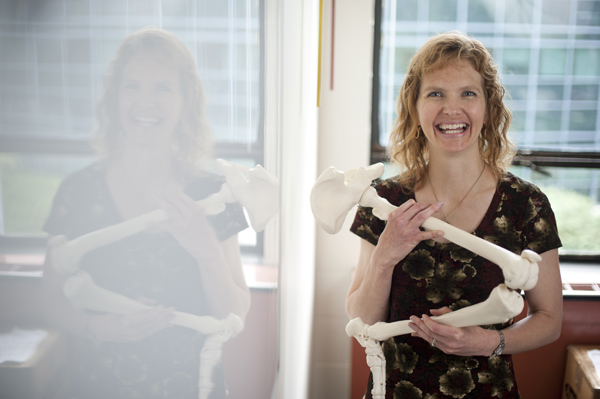Located in the heart of Boston, directly adjacent to the world renowned Longwood Medical Area, Northeastern provides an excellent opportunity for students to combine engineering, medicine and biology.
Beginning Fall 2024 students may pursue the Bioengineering PhD at our Boston, Massachusetts and Portland, Maine campuses.
In The News
Students work with one of more than 75 faculty affiliated with the program toward a degree tailored to suit their interests or take advantage of one of our eight “strength” tracks.
Our interdisciplinary PhD program in Bioengineering draws on the expertise of faculty across the University and reflects the significant strengths of bioengineering research in multiple areas. Students accepted to the program will complete a rigorous core curriculum in basic bioengineering science followed by completion of an immersion track curriculum described in unique features below.
Interdisciplinary curriculum combines engineering, medicine and biology
Bachelor’s and Advanced-degree entry are possible
The PhD in Bioengineering can be combined with a Gordon Engineering Leadership certificate
Students specialize in one of 4 research areas
- Area 1— Biomedical Devices and Bioimaging:
The Biomedical Devices and Bioimaging track reflects Northeastern’s outstanding research profile in developing transformative and translational instrumentation and algorithms to help understand biological processes and disease. Our department has active federally funded research spanning across a broad spectrum of relevant areas in instrument design, contrast agent development, and advanced computational modeling and reconstruction methods. Example research centers and laboratories include the Institute for Chemical Imaging of Living Systems, the Translational Biophotonics Cluster, and the B-SPIRAL signal processing group. - Area 2—Biomechanics, Biotransport, and Mechanobiology:
Motion, deformation, and flow of biological systems in response to applied loads elicit biological responses at the molecular and cellular levels that support the physiological function of tissues and organs and drive their adaptation and remodeling. To study these complex interactions, principles of solid, fluid, and transport mechanics must be combined with measures of biological function. The Biomechanics, Biotransport, and Mechanobiology track embraces this approach and leverages the strong expertise of Northeastern faculty attempting to tie applied loads to biological responses at multiple length and time scales. - Area 3—Molecular, Cell, and Tissue Engineering:
Principles for engineering living cells and tissues are essential to address many of the most significant biomedical challenges facing our society today. These application areas include engineering biomaterials to coax and enable stem cells to form functional tissue or to heal damaged tissue; designing vehicles for delivering genes and therapeutics to reach specific target cells to treat a disease; and uncovering therapeutic strategies to curb pathological cell behaviors and tissue phenotypes. At a more fundamental level, the field is at the nascent stages of understanding how cells make decisions in complex microenvironments and how cells interact with each other and their surrounding environment to organize into complex three-dimensional tissues. Advances will require multiscale experimental, computational, and theoretical approaches spanning molecular-cellular-tissue levels and integration of molecular and physical mechanisms, including the role of mechanical forces. - Area 4—Systems, Synthetic, and Computational Bioengineering:
Research groups in systems, synthetic, and computational bioengineering apply engineering principles to model and understand complex biological systems, including differentiation and development, pathogenesis and cancer, and learning and behavior. This involves designing and implementing methods for procuring quantitative and sometimes very large data sets, as well as developing theoretical models and computational tools for interpreting these data. Deciphering the workings of a biological system allows us to identify potential biomarkers and drug targets, to develop protocols for personalized medicine, and more. In addition, we use the design principles of biological systems we discover to engineer and refine new synthetic biological systems for clinical, agricultural, environmental, and energy applications.
- To develop and demonstrate rigorous knowledge in relevant areas of Bioengineering.
- To develop and demonstrate an ability to plan and perform creative and impactful Bioengineering research.
- To develop and demonstrate and ability to perform critical analysis of scientific journal articles.
- To develop and demonstrate effective written and oral communication skills.
- To prepare students for careers in Bioengineering.
Our graduates pursue careers within academia and beyond.
- Harvard Medical School
- Massachusetts General Hospital
- MIT Lincoln Laboratory
- Northeastern University
- Rockefeller University
- Spaulding Rehabilitation Hospital
- Takeda Pharmaceuticals
- University of Denver
- University of Pennsylvania
- Worcester Polytechnic Institute
Application Materials
A complete set of application materials includes a description of each applicant’s education journey and career goals.
- Completed online application form
- $100 application fee
- Two letters of recommendation
- Transcripts from all institutions attended
- Statement of Purpose
- Resume
- TOEFL, IELTS, or Duolingo for international applicants
Application
PhD Priority: December 15
International outside US: June 1
International inside US: July 1
Domestic: August 1
Apply Now Request Info


